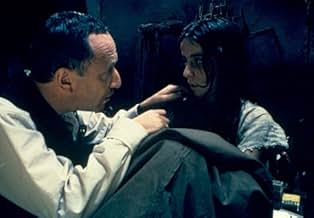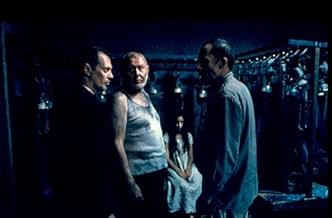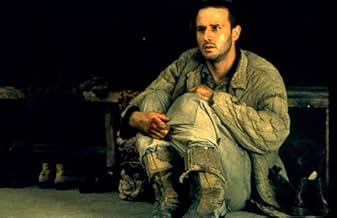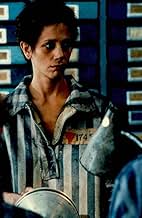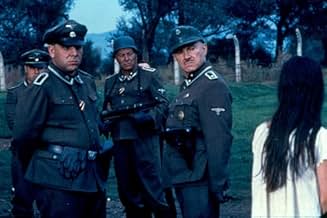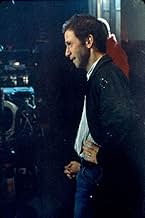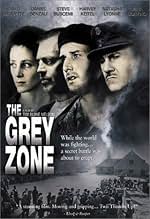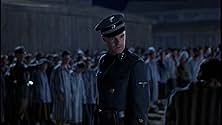Ajouter une intrigue dans votre langueA Nazi doctor, along with the Sonderkommando, Jews who are forced to work in the crematoria of Auschwitz against their fellow Jews, find themselves in a moral gray zone.A Nazi doctor, along with the Sonderkommando, Jews who are forced to work in the crematoria of Auschwitz against their fellow Jews, find themselves in a moral gray zone.A Nazi doctor, along with the Sonderkommando, Jews who are forced to work in the crematoria of Auschwitz against their fellow Jews, find themselves in a moral gray zone.
- Réalisation
- Scénario
- Casting principal
- Récompenses
- 1 victoire et 3 nominations au total
- Lowy
- (as Georgy Zlatarev)
- Anja
- (as Lisa Benavides)
- Woman Inmate
- (as Dafina Katzarrska)
Avis à la une
An unthinkable,unconscionable deal has been worked out between a certain group of Nazi death camp inmates and their captors: in order to avoid the ovens(in all likelihood,only temporarily),these inmates would use their talents(among them,musical) to placate and ease along the funneling of other Jews and "undesirables" into the death chambers. A strong cast and an even stronger screenplay/script is augmented by very intelligent cinematography. Particularly good turns by David Arquette,Steve Buscemi,Daniel Benzali and Mira Sorvino as the inmates,all desperate,all convinced of what they have to do to survive and in Arquette's character's case,not even certain if it is even worth it.
It would be tempting to slam "Schindler's List" after seeing this,but I won't. SL is meant as an epic,a tribute,a story of the upside of surviving through the most dense of human tragedy,whereas GZ is a decidedly darker exploration of what happens to people in the same situation but are pushed into much less noble,much more selfish and desperate devices. Both are strong examples of the genre,but where GZ triumphs is that that it explores the most damning actions through the consciences of people faced with decisions that nobody should have to make. It is an unflinching portrait of a dark chapter in human history,rife with detail and completely lacking of lecturing. THis film is for anyone who wants to see an unvarnished and stark portrayal of the human condition brought to its lowest denominator. A must-see for college classrooms and Holocaust museums anywhere!
It's images are haunting.
Do to its depressing topic and even more disturbing ending others have criticized this movie as not being "entertaining". In fact it is entertaining. It is a horror movie of the real kind. The horror of human evil based on prejudice and hatred.
Everyone needs to see this movie, with the exception of those who lived through it, as they already know!
Good cast with Harvey Keitel, Mira Sorvino, Steve Buscemi and an impressive performance for a change by David Arquette. Arquette chose a very serious role-a Jewish prisoner at a Nazi concentration camp and played it off well.
This is based on a true story about a group of Jewish concentration camp inmates at Auschwitz that plan on smuggling in dynamite to blow up one of the crematoriums. Their plan gets discovered by the SS and killings and torture run rampant to try and get them to confess and give details of their plans.
A teenage girl happens to survive one of the gassings and the camp inmates become obsessed with saving her, even though it could be at the expense of many lives.
There were some people that saw this movie because they couldn't get in to see "Frida". Some people had no idea what this movie was about before they saw it. Some people asked me before it started and I told them and they still chose to stay. If you are a history buff and like Holocaust movies and want to see a true story told through the eyes of the writers, you might like this movie but be prepared to see endless killings working around a decent script that could have been better written. However if you can appreciate the fact that the makers are trying to educate people on the Holocaust and bring to light just how cruel and horrible Hitler's Third Reich was, the movie is sad, depressing, but does have some educational value. Not every single Jew willingly accepted what was going to happen to them, a few tried to rebel and that's why this story was told.
Not very easy on the eyes, bring the Kleenex and watch with shock as one of history's most horrible atrocities is brought to the screen.
7/10.
After having read Eyewitness Auschwitz, written by a member of the Sonderkommando, and "Auschwitz: A Doctor's Eyewitness Account" by the completely self-absorbed doctor (in reality, not the movie) upon which this film is based, I'm glad this project was undertaken. It is a well-made movie that tries to portray too many of the complicated issues that involved with the subject. It has received some harsh criticism, especially by some who claim to be interested in the subject, but obviously missed many points in the movie. Since I don't know of any other films about the revolt of the twelfth Sonderkommando of Birkenau, I think this one is very good.
One final note: Some people seem to think that the title refers to some moral dilemma faced by the characters. While that certainly was an issue for some who were there, and while the movie title may convey a double meaning, the main reason Birkenau was referred to as the Grey Zone was due to the coating of ash from burned human corpses that covered everything, including those who lived and worked there. It was on the ground, on the buildings, and on their clothing. They literally ate and breathed it 24 hours a day.
Le saviez-vous
- AnecdotesWriter and Director Tim Blake Nelson made Dr. Miklos Nyiszli's memoirs "Auschwitz: A Doctor's Eyewitness Account" (1946) mandatory reading for the film's cast, along with Primo Levi's "The Drowned and the Saved" (1986) and Filip Müller's "Eyewitness Auschwitz" (1979).
- GaffesAfter the men set the crematoria 4 on fire they tore down the fences and fled into the woods. They barricaded themselves in a barn where SS caught them. They were burned alive inside the barn.
- Citations
Hoffman: I used to think so much of myself... What I'd make of my life. We can't know what we're capable of, any of us. How can you know what you'd do to stay alive, until you're really asked? I know this now. For most of us, the answer... is anything. It's so easy to forget who we were before... who we'll never be again. There was this old man, he pushed the carts, and on our first day, when we had to burn our own convoy, his wife was brought up on the elevator. Then his daughter... and then both his grandchildren. I knew him. We were neighbors. And in 20 minutes, his whole family, and all its future, was gone from this earth. Two weeks later, he took pills and was revived. We smothered him with his own pillow, and now I know why. You can kill yourself. That's the only choice. I want them to save you. I want them to save you more than I want anything. I pray to God we save you.
- ConnexionsFeatured in WatchMojo: Top 10 Holocaust Films (2014)
- Bandes originalesRoses from the South Op. 388
(1880)
Composed by Johann Strauss (as Johann Strauss)
Orchestrated and arranged by Jeff Danna and Andrew Lockington
Performed and conducted by members of the Bulgarian Symphony Orchestra
Meilleurs choix
Détails
- Date de sortie
- Pays d’origine
- Site officiel
- Langues
- Aussi connu sous le nom de
- Gri Bölge
- Lieux de tournage
- Sociétés de production
- Voir plus de crédits d'entreprise sur IMDbPro
Box-office
- Budget
- 5 000 000 $US (estimé)
- Montant brut aux États-Unis et au Canada
- 517 872 $US
- Week-end de sortie aux États-Unis et au Canada
- 24 526 $US
- 20 oct. 2002
- Montant brut mondial
- 621 592 $US
- Durée
- 1h 48min(108 min)
- Couleur
- Mixage
- Rapport de forme
- 1.85 : 1


